
The X Window System is a windowing system for bitmap displays, common on Unix-like operating systems.

XFree86 is an implementation of the X Window System. It was originally written for Unix-like operating systems on IBM PC compatibles and was available for many other operating systems and platforms. It is free and open source software under the XFree86 License version 1.1. It was developed by the XFree86 Project, Inc. The lead developer was David Dawes. The last released version was 4.8.0, released December 2008. The last XFree86 CVS commit was made on May 18, 2009; the project was confirmed dormant in December 2011.
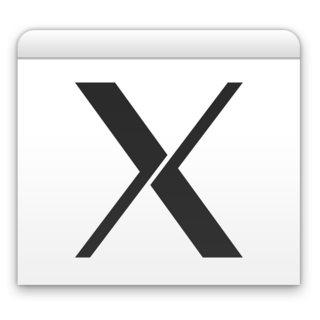
XQuartz is an open-source version of the X.Org X server, a display server for the X Window System that runs on macOS. It formally replaced Apple's internal X11 app. The name "XQuartz" derives from Quartz, part of the macOS Core Graphics framework, to which XQuartz connects these applications. XQuartz allows cross-platform applications using X11 for the GUI to run on macOS, many of which are not specifically designed for macOS. This includes numerous scientific and academic software projects.
freedesktop.org (fd.o), formerly X Desktop Group (XDG), is a project to work on interoperability and shared base technology for free-software desktop environments for the X Window System (X11) and Wayland on Linux and other Unix-like operating systems. Although freedesktop.org produces specifications for interoperability, it is not a formal standards body.
X.Org Server is the free and open-source implementation of the X Window System (X11) display server stewarded by the X.Org Foundation.
GLX is an extension to the X Window System core protocol providing an interface between OpenGL and the X Window System as well as extensions to OpenGL itself. It enables programs wishing to use OpenGL to do so within a window provided by the X Window System. GLX distinguishes two "states": indirect state and direct state.
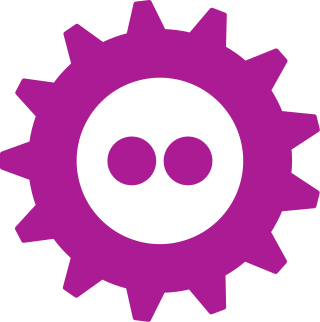
Free and Open source Software Developers' European Meeting (FOSDEM) is a non-commercial, volunteer-organized European event centered on free and open-source software development. It is aimed at developers and anyone interested in the free and open-source software movement. It aims to enable developers to meet and to promote the awareness and use of free and open-source software.
Keith Packard is a software developer, best known for his work on the X Window System.
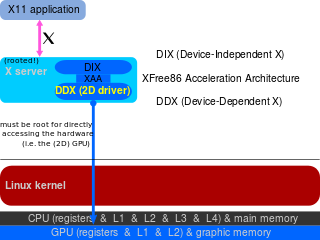
In computing, EXA is a graphics acceleration architecture of the X.Org Server designed to replace XAA and to make the XRender extension more usable, with only minor changes needed to adapt obsolete XFree86 video drivers written to use XAA; it was designed by Zack Rusin and announced at LinuxTag 2005 and first released with X.Org Server version 6.9/7.0.

The Software Freedom Law Center (SFLC) is an organization that provides pro bono legal representation and related services to not-for-profit developers of free software/open source software. It was launched in February 2005 with Eben Moglen as chairman. Initial funding of US$4 million was pledged by Open Source Development Labs.
The Direct Rendering Manager (DRM) is a subsystem of the Linux kernel responsible for interfacing with GPUs of modern video cards. DRM exposes an API that user-space programs can use to send commands and data to the GPU and perform operations such as configuring the mode setting of the display. DRM was first developed as the kernel-space component of the X Server Direct Rendering Infrastructure, but since then it has been used by other graphic stack alternatives such as Wayland and standalone applications and libraries such as SDL2 and Kodi.
Mesa, also called Mesa3D and The Mesa 3D Graphics Library, is an open source implementation of OpenGL, Vulkan, and other graphics API specifications. Mesa translates these specifications to vendor-specific graphics hardware drivers.
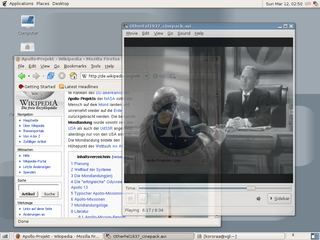
Xgl is an obsolete display server implementation supporting the X Window System protocol designed to take advantage of modern graphics cards via their OpenGL drivers, layered on top of OpenGL. It supports hardware acceleration of all X, OpenGL and XVideo applications and graphical effects by a compositing window manager such as Compiz or Beryl. The project was started by David Reveman of Novell and first released on January 2, 2006. It was removed from the X.org server in favor of AIGLX on June 12, 2008.
D-Bus is a message-oriented middleware mechanism that allows communication between multiple processes running concurrently on the same machine. D-Bus was developed as part of the freedesktop.org project, initiated by GNOME developer Havoc Pennington to standardize services provided by Linux desktop environments such as GNOME and KDE.
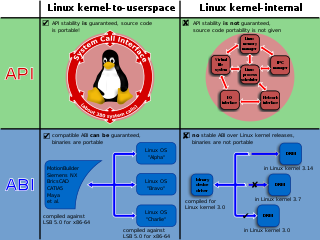
The Linux kernel provides multiple interfaces to user-space and kernel-mode code that are used for varying purposes and that have varying properties by design. There are two types of application programming interface (API) in the Linux kernel:
- the "kernel–user space" API; and
- the "kernel internal" API.

A free and open-source graphics device driver is a software stack which controls computer-graphics hardware and supports graphics-rendering application programming interfaces (APIs) and is released under a free and open-source software license. Graphics device drivers are written for specific hardware to work within a specific operating system kernel and to support a range of APIs used by applications to access the graphics hardware. They may also control output to the display if the display driver is part of the graphics hardware. Most free and open-source graphics device drivers are developed by the Mesa project. The driver is made up of a compiler, a rendering API, and software which manages access to the graphics hardware.

nouveau is a free and open-source graphics device driver for Nvidia video cards and the Tegra family of SoCs written by independent software engineers, with minor help from Nvidia employees.

Wayland is a communication protocol that specifies the communication between a display server and its clients, as well as a C library implementation of that protocol. A display server using the Wayland protocol is called a Wayland compositor, because it additionally performs the task of a compositing window manager.

Lennart Poettering is a German software engineer working for Microsoft and the original author of PulseAudio, Avahi and systemd.














